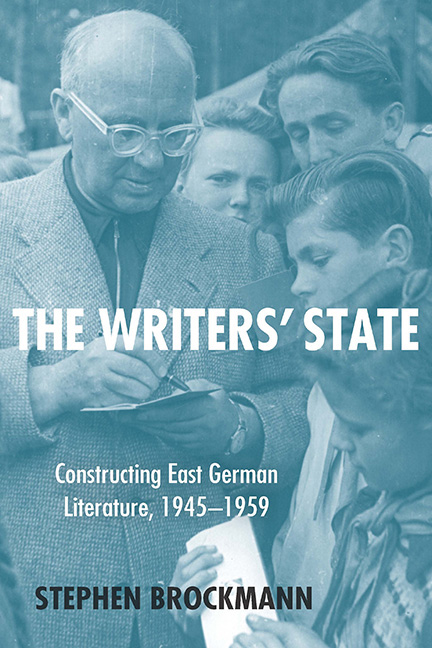Book contents
- Frontmatter
- Dedication
- Contents
- Acknowledgments
- Introduction: Reconstructing East German Literature
- Part I The Absence of State (1945)
- 1 In the Zone, 1945
- Part II Constructing the State (1949)
- Part III Contesting the State (1953)
- Part IV The State Cracks Down (1956)
- Conclusion
- Selected Bibliography
- Index
1 - In the Zone, 1945
from Part I - The Absence of State (1945)
Published online by Cambridge University Press: 05 February 2016
- Frontmatter
- Dedication
- Contents
- Acknowledgments
- Introduction: Reconstructing East German Literature
- Part I The Absence of State (1945)
- 1 In the Zone, 1945
- Part II Constructing the State (1949)
- Part III Contesting the State (1953)
- Part IV The State Cracks Down (1956)
- Conclusion
- Selected Bibliography
- Index
Summary
EAST GERMAN LITERATURE EMERGED from a country in ruins. In May 1945 Germany was at a historic nadir. Soviet, American, and British troops occupied the country. Millions of people were hungry or homeless. Millions more were dead. Hundreds of thousands of German women had been raped by invading soldiers, especially by members of the Soviet Red Army. No functioning German government existed. The victorious Allies refused to recognize or acknowledge what minimal government there was. They arrested the nominal leader of the German government, Admiral Karl Dönitz, on 23 May and later put him on trial for war crimes in Nuremberg. Dönitz was convicted and spent the next decade in prison. Other German military leaders fared even worse. Field Marshal Wilhelm Keitel, who signed Germany's surrender to the Soviet Union in Berlin-Karlshorst on 8 May 1945, was hanged at Nuremberg on 16 October 1946. His colleague General Alfred Jodl, who had signed the surrender to the United States in Reims, France, on 7 May 1945, met the same fate in the same place on the same day. Adolf Hitler, the Nazi “Führer,” had escaped punishment by committing suicide on 30 April 1945. Not long before, he had proclaimed his indifference to the destruction of much of Germany, proclaiming, “If the war is lost, the people will be lost also. It is not necessary to worry about what the German people will need for elemental survival.”
What was to emerge more than four years later, in October of 1949, as the German Democratic Republic (GDR), was, in 1945, merely the Soviet Zone of Occupation. In fact, however, about one third of the future GDR—including cities such as Leipzig, Halle, Erfurt, Weimar, Jena, Eisenach, and even part of Magdeburg—was still under American occupation at the end of the war. In July American troops ceded these areas of Mecklenburg, Thuringia, Saxony, and Saxony-Anhalt to the Soviet Union, as had been arranged at the Yalta conference in February 1945 between Joseph Vissarionovich Stalin, Franklin Delano Roosevelt, and Winston Churchill, the so-called Big Three, in return for the western sectors of the German capital, Berlin, which had previously been occupied only by Soviet troops.
- Type
- Chapter
- Information
- The Writers' StateConstructing East German Literature, 1945-1959, pp. 27 - 70Publisher: Boydell & BrewerPrint publication year: 2015



